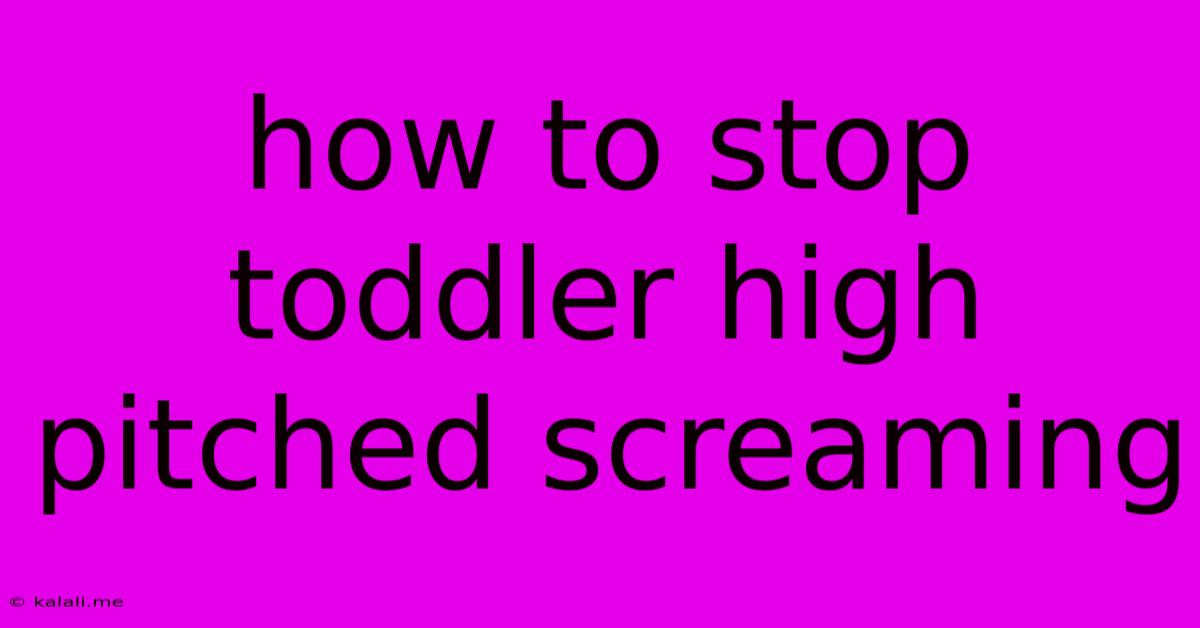How To Stop Toddler High Pitched Screaming
Kalali
Jun 05, 2025 · 3 min read

Table of Contents
How to Stop Toddler High-Pitched Screaming: A Parent's Guide
Toddler high-pitched screaming. The sound alone can send shivers down a parent's spine. It's a common frustration, but understanding the why behind the screams is the first step toward finding effective solutions. This article will explore the root causes of this behavior and provide practical, evidence-based strategies to help you navigate this challenging phase. We'll cover everything from identifying triggers to implementing positive parenting techniques, helping you regain your peace and foster a more harmonious home environment.
Understanding the Root Causes of High-Pitched Screaming
Toddlers scream for a variety of reasons, often because they haven't yet developed the language skills to express their emotions effectively. This high-pitched screaming is often a sign of:
- Frustration: Inability to communicate needs, unmet desires (like wanting a specific toy), or difficulty completing tasks can lead to explosive outbursts.
- Overwhelm: Sensory overload from loud noises, bright lights, or crowded spaces can trigger screaming. Think about the impact of a busy shopping mall or a noisy family gathering.
- Anger: Feeling powerless or unfairly treated can result in intense emotional displays.
- Attention-seeking: Sometimes, screaming is a way for toddlers to get a response, even a negative one, from caregivers.
- Physical discomfort: Hunger, tiredness, illness, or even a minor discomfort can manifest as screaming.
- Developmental leaps: Periods of rapid development can be stressful for toddlers, leading to increased emotional reactivity.
Effective Strategies to Manage Toddler Screaming
The key is to address the underlying cause and implement consistent, positive parenting techniques. Here are some practical strategies:
1. Identify and Minimize Triggers:
- Keep a journal: Note down when and why the screaming occurs. Identify patterns and common triggers (e.g., specific times of day, locations, activities).
- Sensory regulation: Create a calm and predictable environment. Minimize overwhelming stimuli and provide quiet spaces for your toddler to retreat to when needed.
- Structure and Routine: Predictable routines can reduce anxiety and frustration. Clear expectations and consistent limits help toddlers feel secure.
2. Teach Emotion Regulation Skills:
- Label emotions: Help your toddler identify and name their feelings ("It looks like you're feeling frustrated because you can't build the tower").
- Model calm behavior: Children learn by observing. Show your toddler how you manage your own emotions in challenging situations.
- Deep breathing exercises: Teach simple breathing techniques to help your toddler calm down. Make it a fun game!
3. Positive Reinforcement and Ignoring (Selective Attention):
- Reward calm behavior: Praise and reward your child when they use appropriate coping mechanisms, such as using words to express their needs or taking deep breaths.
- Ignore attention-seeking screams (if safe): If you suspect the screaming is for attention, calmly ignore it unless it's escalating to unsafe behavior. This requires consistency and patience.
4. Positive Communication and Empathy:
- Get down to their level: Connect with your child physically and emotionally. Make eye contact and speak softly.
- Validate their feelings: Acknowledge their emotions without judgment ("I understand you're upset, it's frustrating when things don't go your way").
- Offer choices: Giving your toddler a sense of control can reduce frustration. Offer limited choices ("Do you want to wear the blue shirt or the red shirt?").
5. Seek Professional Help:
If screaming is persistent, severe, or accompanied by other concerning behaviors, consult your pediatrician or a child psychologist. They can help rule out underlying medical conditions or provide additional support and guidance. This is particularly crucial if the screaming is impacting your family's well-being significantly.
Conclusion: A Path to Peaceful Parenting
Managing a toddler's high-pitched screaming requires patience, understanding, and a consistent approach. By identifying triggers, teaching emotional regulation, and employing positive parenting techniques, you can create a more peaceful and harmonious home environment. Remember, this phase is temporary. With the right strategies, you can navigate this challenging period and foster a strong, healthy relationship with your child.
Latest Posts
Latest Posts
-
How To Call Another Bat From Within A Bat File
Jun 06, 2025
-
Ditra Heat 15 Or 20 Amp
Jun 06, 2025
-
What Civilization Was The First To Practice Monotheism
Jun 06, 2025
-
Can You Leave A Hose On All The Time
Jun 06, 2025
-
15 Amp Plug On 20 Amp Circuit
Jun 06, 2025
Related Post
Thank you for visiting our website which covers about How To Stop Toddler High Pitched Screaming . We hope the information provided has been useful to you. Feel free to contact us if you have any questions or need further assistance. See you next time and don't miss to bookmark.